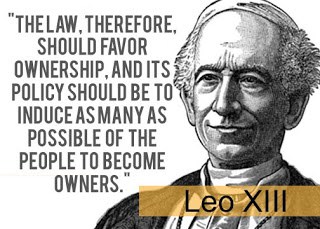T
tafan2
Guest
timothy, I am not arguing that distributionism does not follow principles laid out in Rerum Novaram. But Leo XIII did not teach it by any name. Note: by saying this I am not arguing against distributionism. Only saying lets not overstate the Church’s teaching of it.
You can also read (and it is a very good read) the Compendium of Social Doctrine of the Church, published under the pontificate of John Paul II, and you will not find distributionism taught. But again, you will find that most flavors of distributionism are inline with that document’s principles also.
One has to look at Chesterton and Belloc as the “fathers” of distributionism. But they didn’t get everything right, just a lot. And one could not move immediately towards a distributionist economic system without going through some sort of revolution (my opinion, not theirs). And that would not be a good thing. Chesterton and Belloc may not have been opposed, but I would be. So we have to look at our to transform our system towards that over time.
You can also read (and it is a very good read) the Compendium of Social Doctrine of the Church, published under the pontificate of John Paul II, and you will not find distributionism taught. But again, you will find that most flavors of distributionism are inline with that document’s principles also.
One has to look at Chesterton and Belloc as the “fathers” of distributionism. But they didn’t get everything right, just a lot. And one could not move immediately towards a distributionist economic system without going through some sort of revolution (my opinion, not theirs). And that would not be a good thing. Chesterton and Belloc may not have been opposed, but I would be. So we have to look at our to transform our system towards that over time.
Last edited:

